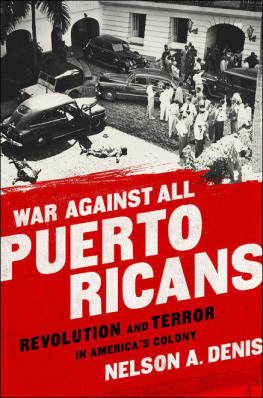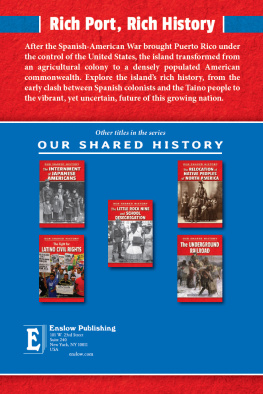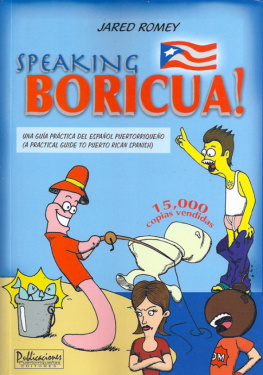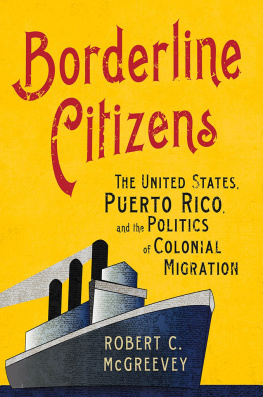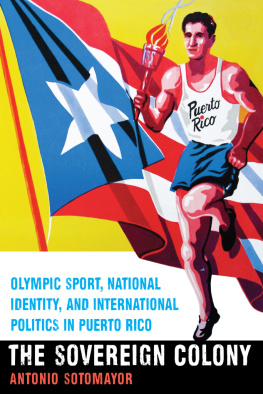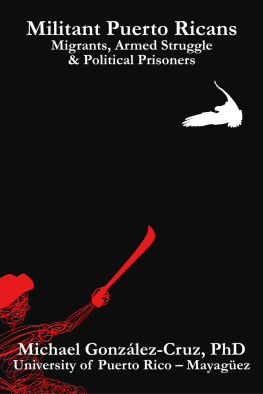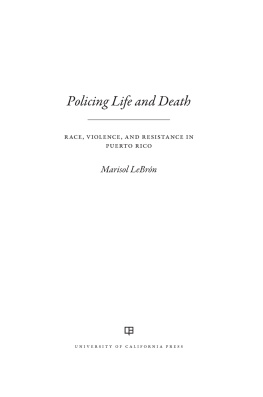War Against All Puerto Ricans

Copyright 2015 by Nelson A. Denis.
Published by
Nation Books, A Member of the Perseus Books Group
116 East 16th Street, 8th Floor
New York, NY 10003
Nation Books is a co-publishing venture of the Nation Institute and the Perseus Books Group.
All rights reserved. Printed in the United States of America. No part of this book may be reproduced in any manner whatsoever without written permission except in the case of brief quotations embodied in critical articles and reviews. For information, address the Perseus Books Group, 250 West 57th Street, 15th Floor, New York, NY 10107.
Books published by Nation Books are available at special discounts for bulk purchases in the United States by corporations, institutions, and other organizations. For more information, please contact the Special Markets Department at the Perseus Books Group, 2300 Chestnut Street, Suite 200, Philadelphia, PA 19103, or call (800) 255-1514, or e-mail .
BIG YELLOW TAXI
Words and Music by JONI MITCHELL
1970 (Renewed) CRAZY CROW MUSIC.
All Rights Administered by SONY/ATV MUSIC PUBLISHING,
8 Music Square West, Nashville, TN 37203.
All Rights Reserved
Library of Congress Cataloging-in-Publication Data
Denis, Nelson A.
War against all Puerto Ricans : revolution and terror in Americas colony / Nelson A. Denis. pages cm
Includes bibliographical references and index.
ISBN 978-1-56858-501-7 (hardcover)ISBN 978-1-56858-502-4 (electronic) 1. Albizu Campos, Pedro, 18911965. 2. Puerto RicoHistoryAutonomy and independence movements. 3. Puerto RicoPolitics and government18981952. 4. NationalismPuerto RicoHistory20th century. 5. Puerto RicoRelationsUnited States. 6. United StatesRelationsPuerto Rico. I. Title.
F1975.A45D46 2015
972.95052dc23
2014047904
For my mother, Sarah, my grandmother, Salome, and Migdalia, who holds them in her heart.
CONTENTS
There will be war to the death against all Puerto Ricans.
E. FRANCIS RIGGS, Chief of Police of Puerto Rico
They were conquerors... They grabbed what they could get for the sake of what was to be got. It was just robbery with violence, aggravated murder on a grand scale... The conquest of the earth, which mostly means the taking it away from those who have a different complexion or slightly flatter noses than ourselves, is not a pretty thing when you look into it too much.
JOSEPH CONRAD, Heart of Darkness
My mother was Puerto Rican. My father was Cuban. They worked very hard, and we lived in a small but spotless apartment in New York Citys Washington Heights. I was eight years old when men from the FBI banged on our door at 3 a.m. No one understood what was happening: my mother screamed, my grandmother cried, and I hid behind a curtain. The FBI agents grabbed my father and took him away; we never saw him again.
It was October 1962, the height of the Cuban Missile Crisis, and someone had denounced my father as a spy. There was no trial or administrative hearing, no evidence or due processhe was simply deported to Cuba. A few months later, in June 1963, Attorney General Robert F. Kennedy received his annual Immigration and Naturalization Service report, which stated, Investigation of Cuban refugees increased during this year. Under this pressure, a number of Cubans alleged to be subversive departed prior to the completion of the investigations. These included... Antonio Denis Jordan, suspected Cuban G-2 agent in New York City.
My father was an elevator operator and a member of the janitors union, 32BJ SEIU. He supported the Cuban Revolution and spoke in favor of it during the late 1950s. He even read Bohemia (a leftist magazine) and showed me the 1959 Bohemia of Freedom issue, with its gruesome photos of bodies massacred by Cuban dictator Fulgencio Batista. He was a Cuban patriot, but he was not a spy.
This didnt matter to the United States, which never allowed him to return. My mother raised me by herself, working in belt factories for $50 a week, and I vowed to become a lawyer so that no one would knock on our door again and rip our family apart.
As a Harvard undergraduate, I noticed a strange thing in Widener Library: it had fifty-seven miles of shelves and 3 million books, but the 1973 card catalog contained not even a single volume about Pedro Albizu Campos, the principal figure in Puerto Rican political history. I responded with my own scholarship: a study of the fraudulent constitution of Puerto Rico, which became the cover story for the 1977 Harvard Political Review.
Over the subsequent forty years, I have continued to research the life and death of Albizu Campos. I visited my family in Puerto Rico dozens of times, particularly in Caguas, where they helped me meet members of the Nationalist Party, a political organization deeply committed to Puerto Rican independence. Some of these Nationalists served time with Albizu in the Atlanta federal penitentiary. Others were imprisoned with him in La Princesa, a prison in San Juan. Still others were tortured in Aguadilla. All of them had vivid memories of El Maestro (the Teacher) and the revolution he ignited.
I wasnt writing a book yet; I was recovering my own past and understanding certain quirks in the Puerto Rican personality. For example, we see so many huge, surrealistic flags during the New York Puerto Rican Day Parade because all Puerto Rican flags were illegal on the island from 1948 until 1957. Even a Nobel Prize nominee, Francisco Matos Paoli, was sentenced to twenty years in La Princesa for owning one.
Over time I became a lawyer, the editorial director of El Diario/La Prensa, and a New York State assemblyman. This enabled me to access more people and information, but I still wasnt writing a book. And then I saw the FBI files.
The bureau kept secret dossiers on Puerto Ricans for over sixty years. There are 1.8 million pages of files about Albizu Campos, the Nationalist Party, Puerto Ricos October 1950 revolution, and over 100,000 Puerto Ricans, most of whom had no idea that they were being followed.
These files contain surveillance notes, telephone taps, bank account information, criminal and medical records, tax returns, credit card numbers, professional licenses, school transcripts, child support payments, home mortgage documents, job applications, voting and credit histories, wedding lists, sexual profiles, and neighborhood gossip. The FBI used them to monitor and control people. The bureau also used them to destroy careers. When I saw these files, I thought of my father. Infuriated, I finally decided to write this book.
I read thousands of FBI documents and hundreds of newspaper accounts; I scoured university, museum, and historical society archives. I tracked down oral histories, personal interviews, private correspondence, diaries, church registries, and old photos. I read amicus curiae briefs, congressional testimony, Senate committee reports, CIA manuals, and Defense Department contracts. I walked the streets of Puerto Rico where people had been murdered. I talked to their families. Then I started writing.

Next page
